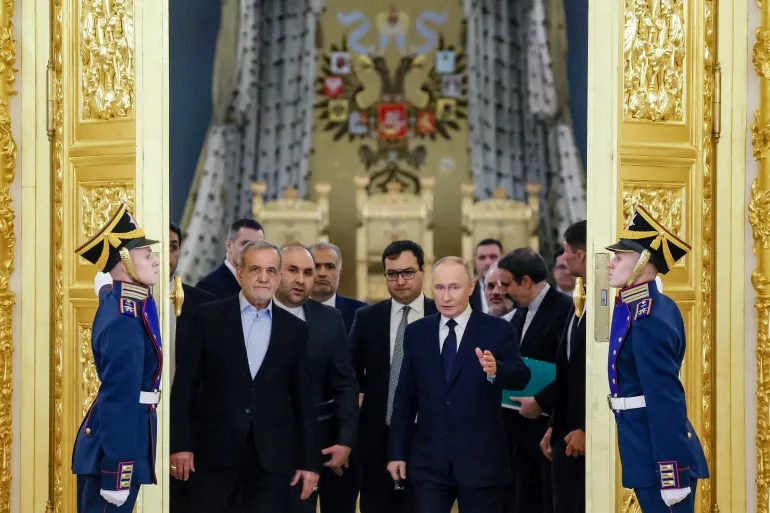In a move signaling closer ties between two of the world’s most heavily sanctioned nations, Russian President Vladimir Putin and Iranian President Masoud Pezeshkian signed a “comprehensive strategic partnership treaty” in Moscow on Friday. The pact marks a significant milestone in Russia-Iran relations, covering a broad spectrum of areas including trade, military cooperation, energy, and cultural exchange.
At a joint press conference, President Putin hailed the agreement as a “real breakthrough” that would foster “stable and sustainable development” for both nations and the wider region. While specifics of the treaty remain under wraps, the Kremlin confirmed that it aims to enhance military, political, and economic cooperation between Tehran and Moscow.
Strengthening Strategic Ties
President Pezeshkian described the treaty as the beginning of a “new chapter” in Iran-Russia relations, particularly in trade. Both nations have ramped up collaborative efforts in response to mounting Western sanctions, with Iran reportedly supplying Russia with Shahed drones that have been deployed in the conflict in Ukraine, according to Ukrainian and Western officials.
The treaty builds upon a 2001 framework that has been periodically renewed. Russian Foreign Minister Sergei Lavrov called the agreement “constructive in nature,” adding that it is designed to strengthen the capabilities of Russia, Iran, and their allies across the globe. According to Iranian Ambassador to Russia Kazem Jalali, the treaty will remain in effect for 20 years, as reported by Russian state news agency TASS.
Regional Implications
Since the start of its invasion of Ukraine in 2022, Russia has increasingly leaned on Iran as a key strategic partner. This growing alliance has raised concerns among Western nations, who view the two countries as destabilizing forces on the global stage.
Iran’s foreign policy has faced setbacks in recent years, including challenges in Syria, where opposition forces weakened the regime of Bashar al-Assad—a key ally of both Tehran and Moscow. The treaty is seen as a way for Iran to bolster its international standing amid these challenges.
Putin has also been working to deepen ties with other nations critical of U.S. dominance, including China and North Korea, as part of his foreign policy strategy.
Treaty Signed Amidst U.S. Transition
The timing of the treaty’s signing is notable, coming just days before U.S. President-elect Donald Trump’s return to power. Trump, known for his hardline stance on Iran, has previously threatened swift military action to address conflicts in Ukraine and the Middle East. During his first term, Trump withdrew the U.S. from a multinational deal that offered Iran sanctions relief in exchange for nuclear restrictions.
The new partnership between Moscow and Tehran underscores their shared goal of countering what they describe as U.S.-led “global hegemony.” As the geopolitical landscape shifts, the treaty is expected to solidify Russia and Iran’s roles as key allies in challenging Western influence.




